- Home
- Michael Crichton
The Andromeda Evolution Page 6
The Andromeda Evolution Read online
Page 6
In any case, Vedala had never failed a test in her life.
Choosing to accept Stern’s offer of military clearance, she had listened intently to every detail of the incident in Piedmont, Arizona. When it was over, she understood her role perfectly.
At first assumed to be an organism, the Andromeda Strain actually seemed to have more in common with a new area of science—nanotechnology, the study of machines less than one hundred nanometers in size.
Vedala had devoted her career to understanding the topography of nanoscopic structures, and the construction of artifacts small enough to fit on a pinhead (along with however many angels wished to dance there). She knew there was vast potential waiting for humankind in the realm of nanoscale. After a single conversation with Stern, it became her life’s work to understand this mysterious extraterrestrial microparticle.
So far, her studies had been a resounding success.
Vedala’s most brilliant insight had been to expose the two varieties of Andromeda to each other. Studying the results at a nanoscale, she discovered that each strain ignored the presence of the other. As close cousins, the substances seemed to have entered into a kind of noncompete agreement.
Essentially, AS-1 and AS-2 were invisible to each other.
Realizing this, Vedala had been able to mass-produce a spray coating with a nanostructure mimicking the contours of both Andromeda strains, creating a surface that was nonreactive to both. Vedala’s brilliance did not extend to naming her creation, however; the antibonding mechanism was dubbed simply “aerosolized nanocrystalline cellulose-based Andromeda inhibitor.”
The inhibitor had been utilized so far to protect low-orbit spy satellites and government rocket launches from atmospheric AS-2. This represented humankind’s first mastery over the strange, plastic-eating microparticle after decades of highly classified study in the laboratory. Now the time had come for Vedala to test her creation face-to-face against the first documented “wild” appearance of Andromeda. And she did not intend to fail.
It was nearly noon. Every other member of her team had already arrived, whisked away from their respective lives to the middle of the Amazon jungle.
All of them had been on time, except for one: James Stone, PhD.
As a roboticist, Stone’s skills were not mission appropriate. In Vedala’s estimation, he should have been replaced with a microbiologist or a bacteriologist. Any number of more multidimensional researchers would be better suited. And yet General Stern had been intransigent on Stone’s inclusion.
Standing beside a muddy river with no name, Vedala knew the stakes of this mission. She also knew its legacy. And thus she had her own idea of why James Stone had been forced onto her roster.
As Stone gathered his luggage, Vedala spit on the ground, turned, and walked away to inspect the hard-cases.
Vedala was an orphan and a self-made success. Her assumption was that James Stone, son of the famous scientist Jeremy Stone, had been included on her field team for a reason she could fundamentally never respect—his family pedigree.
Noon Field Briefing
PENG WU WATCHED THE THREE OTHER SCIENTISTS gather and check their luggage in the hacked clearing without saying a word. Though she of course spoke perfect English, and French and German for that matter, she found silence almost always to be the best response around her European and American colleagues. She had read the dossiers on her team (both the American and the Chinese People’s Liberation Army–supplied documentation), but had met them each just briefly.
Only the older African man, Harold Odhiambo, made her feel comfortable. He spoke slowly and with deliberation. And though he often wore a wry grin below thick round eyeglasses, he refrained from constantly flashing his teeth in glaring and pointless smiles.
Peng knew that with her keen intellect and piercing black eyes, she could appear severe to Westerners, especially civilians. She wasn’t bothered by it. In her estimation, their discomfort was due less to a cultural divide than to the simple fact of her military background and natural disposition.
When she was a small child in Zhengzhou, Peng’s parents were often gone—dispatched on various assignments for the PLA. Left in the care of her grandfather, she had begun to experience separation anxiety that soon blossomed into panic attacks. As a solution, the old man had introduced his granddaughter to the ancient game of weiqi (known as Go in the United States). He explained that life was like the game—and every word spoken, every emotion betrayed through gesture or expression, constituted a move. By controlling each of your moves, you could reduce anxiousness and win the game.
Peng Wu found that she very much liked winning, at weiqi and at life.
From those years on, Peng’s strategy had been to reach her goals in the fewest number of moves. Rising through the ranks of the People’s Liberation Army and undergoing intensely competitive astronaut training, she had learned to suppress her anxiety by choosing her actions carefully, and always with the express intention of accomplishing the mission. In this way, she had strategically chosen to marry an ambitious fellow soldier and had gained the full trust of her government and the military.
Peng turned her attention to a group of a dozen frontiersmen—native jungle specialists who had been hired to clear this landing area and accompany the field team on their expedition into the Amazon. The brown-skinned men blended traditional tribal adornments with modern military equipment. They worked together as a team with wordless efficiency, using the natural resources on hand to craft a base camp out of the raw clearing. Every step, every swing of the machete, was done with a familiar ease that spoke of lifelong jungle experience.
Meanwhile, the civilian scientists were still adjusting to life without their smartphones or the Internet.
Methodically breaking down her traveling backpack to separate out the extra scientific goods that could be hauled by one of the native porters, Peng resolved to stay close to the guides—doing so would maximize her survival probability and therefore the success probability of the mission as a whole.
“FINALLY, WE’RE ALL here,” said Vedala.
The Indian woman barely glanced in the direction of James Stone as he stomped across the muddy clearing, huffing and puffing, dragging a black plastic hard-case full of equipment. Wearing a brand-new khaki outfit, the roboticist was in his early fifties but looked younger. His face was already sweaty in the oppressive heat of high noon.
“Let’s begin,” she added.
Vedala stood under the low ceiling of a maloca—a simple thatch-roofed hut the guides had hastily constructed beside the gurgling brown river. A paper topographic map was spread across a folding table and weighted at the corners with muddy stones. Across from her stood the immaculately outfitted Peng Wu. The PLA Air Force major stood perfectly straight, with martial precision, trim and athletic in a long-sleeved jacket and khaki pants neatly tucked into her boots.
With her military bearing, Peng stood out in stark contrast to the much older Harold Odhiambo, a robust Kenyan man with close-cropped salt-and-pepper hair, a gently amused attitude, and a disheveled outfit complete with cargo shorts and an Australian bush hat with one side pinned up.
Odhiambo turned his kind eyes to Stone as the bedraggled man joined the group under the thatch roof.
“Welcome, Dr. Stone,” said Odhiambo, with an English accent. “I enjoyed your work on collision avoidance using low-resolution imaging. Very efficient.”
Stone was speechless for a moment, surprised that the famous xenogeologist would have bothered to read his work. Then he recalled that Odhiambo supposedly read everything, and with that, his manners returned.
“Thank you, Dr. Odhiambo. That’s very flattering. I apologize that I haven’t caught up with your latest—”
Vedala cut in.
“You can take that offline. Harold has dabbled in just about everything over his career,” she said. “Which is why he’s perfect for our mission. He’s not just a specialist.”
The words hung in the a
ir long enough to be awkward before a modulated ringing interrupted.
“Back to the agenda,” she added.
Vedala picked up an Iridium satellite phone from the table. The chunk of black plastic was a restricted military model commissioned by the Defense Information Systems Agency (DISA). It had been ruggedized, weatherproofed, waterproofed, signal-encrypted, and fitted with a hot-swappable antenna adapter. Currently it was attached to a thin black antenna wire strung around the wooden poles supporting the hut. The ice-blue LED screen glowed coolly in the heat of the jungle, four out of four connection bars illuminated.
“Dr. Sophie Kline is joining us from the International Space Station,” Vedala said, depressing a button to answer the call. “Good afternoon, Doctor, how’s the view from up there?”
“Beautiful, Nidhi, and not a single mosquito.”
The voice on the speakerphone was confident and feminine, but a few lightly slurred syllables and a slight tremor betrayed its owner’s neurodegenerative disease. “I’m over top of you now, but in a few minutes my orbit will carry me beyond the horizon again and our comms may not be so clear.”
Looking at her crew, Vedala continued. “I assume you’ve all read my personal briefing letter, as well as the red folder docs sent by the Department of Defense—”
James Stone raised his hand, and Vedala stopped, lips pursed in annoyance.
“Yes?”
“Sorry to interrupt, Dr. Vedala, but I didn’t get a briefing document.”
Vedala blew a curl of hair away from her eyes in irritation. “No, of course you didn’t. You were a . . . late addition.”
“Oh, I didn’t know—”
“It’s not your fault,” she snapped, more abruptly than she meant to. “Our fearless leader, General Stern, approved the final details of this expedition, and I’m not privy to all the information he had. You can pick up the details as we go—it’s almost time to start the day’s march. This is Project Wildfire, so you all understand the stakes.”
“The fate of the world . . .” Odhiambo smiled.
“You may not be far from the truth,” said Vedala. “Agenda item number one, let’s talk situational background. Twenty-six hours ago a terrain-mapping drone detected a . . . structure in the deep jungle, thirty miles from here. This anomaly is two hundred feet tall, and it appeared within the last two weeks in the middle of impassable jungle, without any known roads or a landing strip. And now for the reason we’re here. Subsequent mass spectrometry readings detected a chemical fingerprint closely matching the original Andromeda incident. Any questions?”
“Another outbreak,” said Odhiambo, in a thoughtful voice. “But why would it be located here, so far from anything else?”
Kline’s voice came in over the satellite phone: “The Chinese Tiangong-1 space station broke up in the atmosphere over Brazil six months ago. It spread bits of wreckage between here and the Atlantic Ocean. We think . . . ah, the Americans think, the Chinese may have been experimenting with Andromeda.”
Peng seemed to have been waiting for this. The former soldier kept her face blank as the others looked to her. Kline’s accusatory tone had not gone unnoticed, and Peng’s response seemed prepared as she spoke.
“Of course I have no official knowledge of this,” said Peng. “However, it would not be an unprecedented scenario, considering the many international efforts under way to study Andromeda in a microgravity environment.”
Vedala nodded, half smiling. Peng was making a pointed remark about the existence of the Wildfire laboratory module on board the ISS, but she was at least willing to acknowledge the reality—an infected sample from the fallen Chinese space station could have contaminated the jungle.
“Regardless of how the anomaly got here, we are facing the reality of a large structure growing in the middle of the jungle with a chemical composition that matches Andromeda. Our plan is to hike into the quarantine zone and find out what this thing is before it gets any bigger. Thanks to the last Project Wildfire, we know a lot more than the people who tried this in Piedmont. Our respirators and inhibitor spray will protect us, and we have toxin detectors operating constantly.”
“I’m surprised the feds didn’t already nuke it on reflex,” said Stone, venturing a joke.
Vedala only scowled. “And start a world war? We’re not in the United States, Dr. Stone. The contamination didn’t appear in our own backyard this time around. We weren’t that lucky—”
At these words, Vedala noticed a change in Stone’s demeanor. He looked away at once, cheeks flushing with anger. She immediately realized how callous her words must have sounded.
“Obviously, what happened in Piedmont wasn’t lucky. But this incident is happening in one of the most ecologically delicate places on the planet, severely limiting our options. We’re in protected indigenous territory, a place where by Brazilian law uncontacted tribes are meant to be left alone. Harold can elaborate.”
“She’s right,” said Harold Odhiambo, addressing the group. “This is Terra Indigena. The indigenous people who live here are isolated, surviving quite comfortably at a mostly pre–Stone Age level of technology.”
Harold spread his long arms, gesturing at the trees.
“We are standing in Earth’s lungs. These tree species spread their roots wide and shallow, cutting off almost all access to bedrock. The people who have lived here for millennia never had the opportunity to develop stone tools. Even their arrowheads are carved from bamboo, completely biodegradable. They have been spared the never-ending progression of technology.”
“You say that as if progress is a bad thing,” said Peng, quietly.
“It is not a bad thing . . . until we show up. Exposed to superior technology, these tribes are vulnerable to being exploited, killed, or enslaved. In the best-case scenario, they will covet our technology—especially our steel and guns. When they do get hold of it, they forget the traditional ways of living and become dependent on tools they can’t reproduce. Any contact, with good or evil intentions, will destroy them. Outsiders either take their lives, or their way of life.”
Odhiambo’s manner had turned grave.
“Our presence in the jungle is highly dangerous. History has played out the same way across every continent, from the indigenous people of Africa to those of Australia and the Americas. It always ends in death.”
“And that’s why we’re not contacting anybody,” said Vedala, pointing to the tree line where the quasi-military men were waiting. “Those are our guides, and they’re going to keep us far away from the locals.”
The dozen uniformed men had collected in shady spots around the edge of the clearing, standing or squatting and talking quietly to each other. From a distance they looked like soldiers, wearing camouflage, with machetes hanging from their hips and shotguns casually strapped over their shoulders.
But looking closer, Stone could see they were indigenous, their crisp military uniforms complemented by traditional clamshell earrings that stretched their earlobes and stiff bamboo shoots poking from their nostrils like jaguar whiskers. Most of the men had waves of bluish lines tattooed across their upper cheeks and thick black hair chopped in bowl cuts.
“Are they not Indians?” asked Peng.
“Those are Matis frontiersmen,” responded Vedala, “and they know this territory well. Until forty years ago, they were one of the uncontacted tribes.”
Vedala nodded to a large man with a sweat-stained green shirt neatly tucked into military fatigues. Unlike the others, this soldier was Anglo, and he carried a high-tech battle rifle strapped over his chest. The weapon appeared well-used, bristling with after-market attachments.
“And the final item on our agenda,” said Vedala. “Meeting our guides.”
As if on cue, the soldier stood and began to stride toward them, heavily muscled arms swinging. The bearded Brazilian American spit out a toothpick as he approached the group, snapping words at them with a Portuguese accent.
“Listen up, people. My name is
Sergeant Eduardo Brink, United States Army Special Forces. I have been instructed by General Stern to handle you with kid gloves. But this is the Amazon wild. This jungle does not care for your credentials. It does not care for your intelligence. Or for your technology. It was here before you and it will be here after you are gone.”
“If we’re lucky,” muttered Stone.
Brink flashed a cold stare down at the roboticist before continuing. “You are already deep into the territory of indios bravos, wild Indians of Brazil. Make no mistake. You are not welcome. It is sheer luck that I was stationed here with FUNAI and available to accompany you. Our rendezvous with command is in forty-eight hours, at the prescribed destination. If we are not there, command will assume we were killed in action and proceed with alternate plans. My job is to get you where you’re going, on time . . . alive.”
Brink’s voice lowered, and he stepped closer to Stone.
“And let me be very clear, amigo . . . without me, you will die here.”
The group of scientists exchanged worried glances, and the sergeant seemed satisfied. Turning, he spoke rapid-fire to the native soldiers, who tossed away cigarettes and rose to their feet. Some pulled tumplines over their foreheads, using the woven straps to carry luggage while leaving their arms free. A few others set off into the jungle without a word. The whistling snaps of machetes were audible as they set about hacking a new path through the dense wall of undergrowth. Brink turned back to the scientists, pulling a toothpick from his shirt pocket and clenching it between his teeth in a wide, menacing smile.
“You don’t have to like me, boys and girls. You just have to obey me. Because the very last thing you want is to end up out here all alone.”
Manifest
DISPATCHED TO THE AMAZON JUNGLE ON AN HOUR’S notice, the Wildfire field team had been as well equipped as possible given the abbreviated logistical timeline. The following partial manifest is technical in nature, but nonetheless illuminating in its content. Previously classified, the full inventory is now stored in the National Archives.

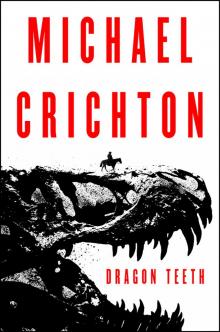 Dragon Teeth
Dragon Teeth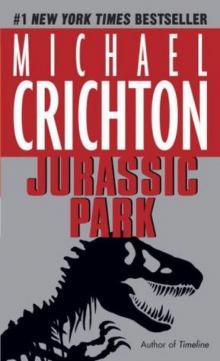 Jurassic Park
Jurassic Park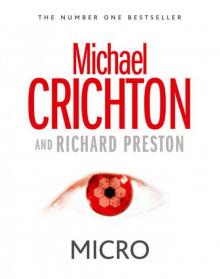 Micro
Micro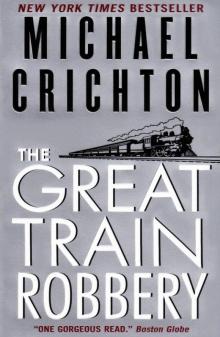 The Great Train Robbery
The Great Train Robbery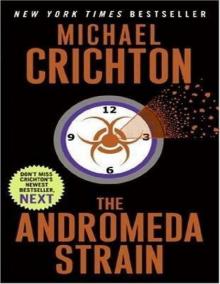 The Andromeda Strain
The Andromeda Strain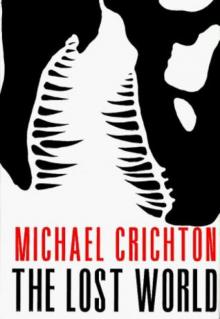 The Lost World
The Lost World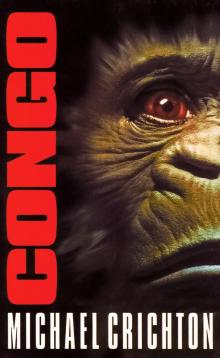 Congo
Congo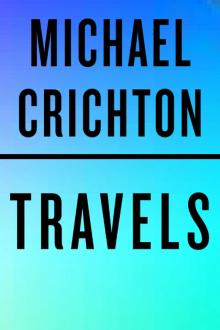 Travels
Travels Timeline
Timeline Sphere
Sphere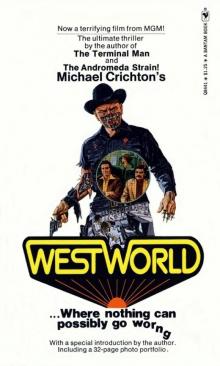 Westworld
Westworld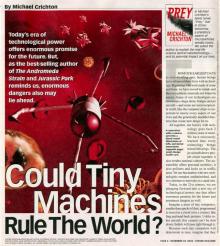 Prey
Prey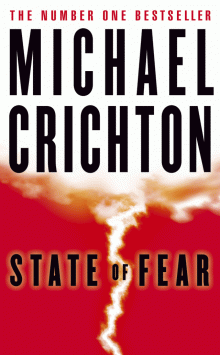 State Of Fear
State Of Fear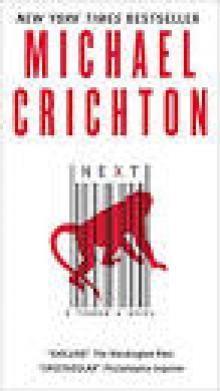 Next
Next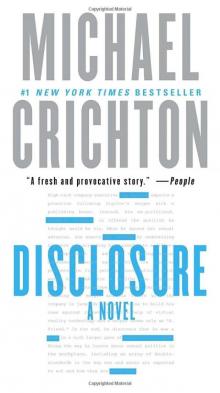 Disclosure
Disclosure Pirate Latitudes
Pirate Latitudes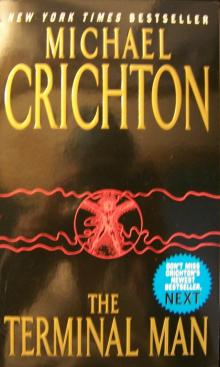 The Terminal Man
The Terminal Man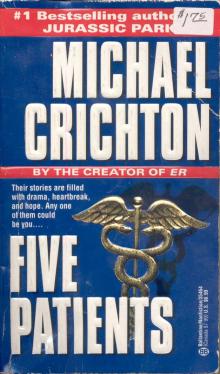 Five Patients
Five Patients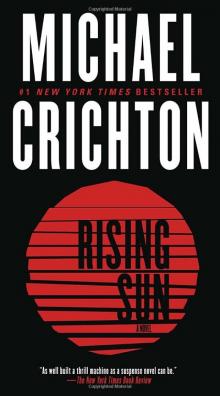 Rising Sun
Rising Sun Binary
Binary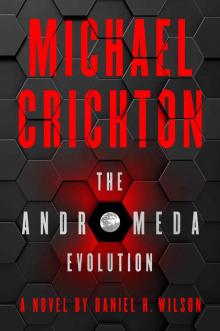 The Andromeda Evolution
The Andromeda Evolution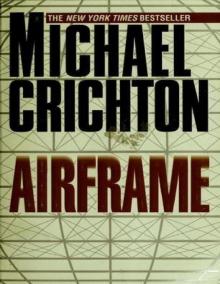 Airframe
Airframe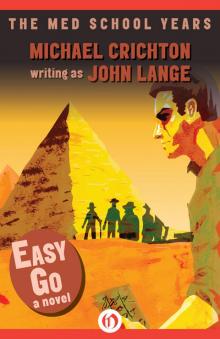 Easy Go
Easy Go Drug of Choice
Drug of Choice Odds On: A Novel
Odds On: A Novel Scratch One
Scratch One Dealing or The Berkeley-to-Boston Forty-Brick Lost-Bag Blues
Dealing or The Berkeley-to-Boston Forty-Brick Lost-Bag Blues Venom Business
Venom Business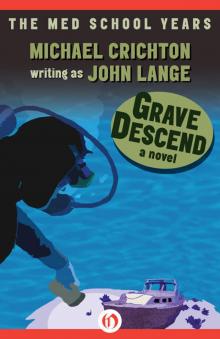 Grave Descend
Grave Descend Gold - Pirate Latitudes
Gold - Pirate Latitudes Binary: A Novel
Binary: A Novel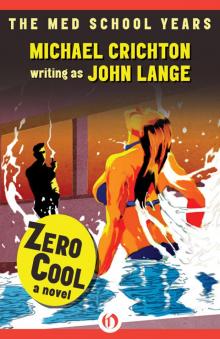 Zero Cool
Zero Cool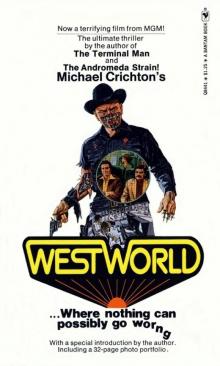 Delos 1 - Westworld
Delos 1 - Westworld